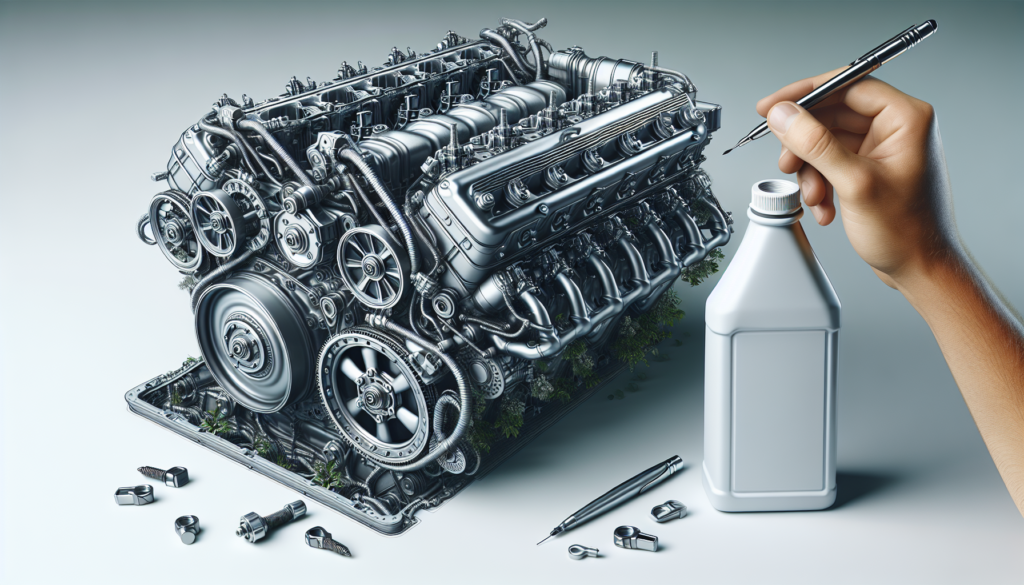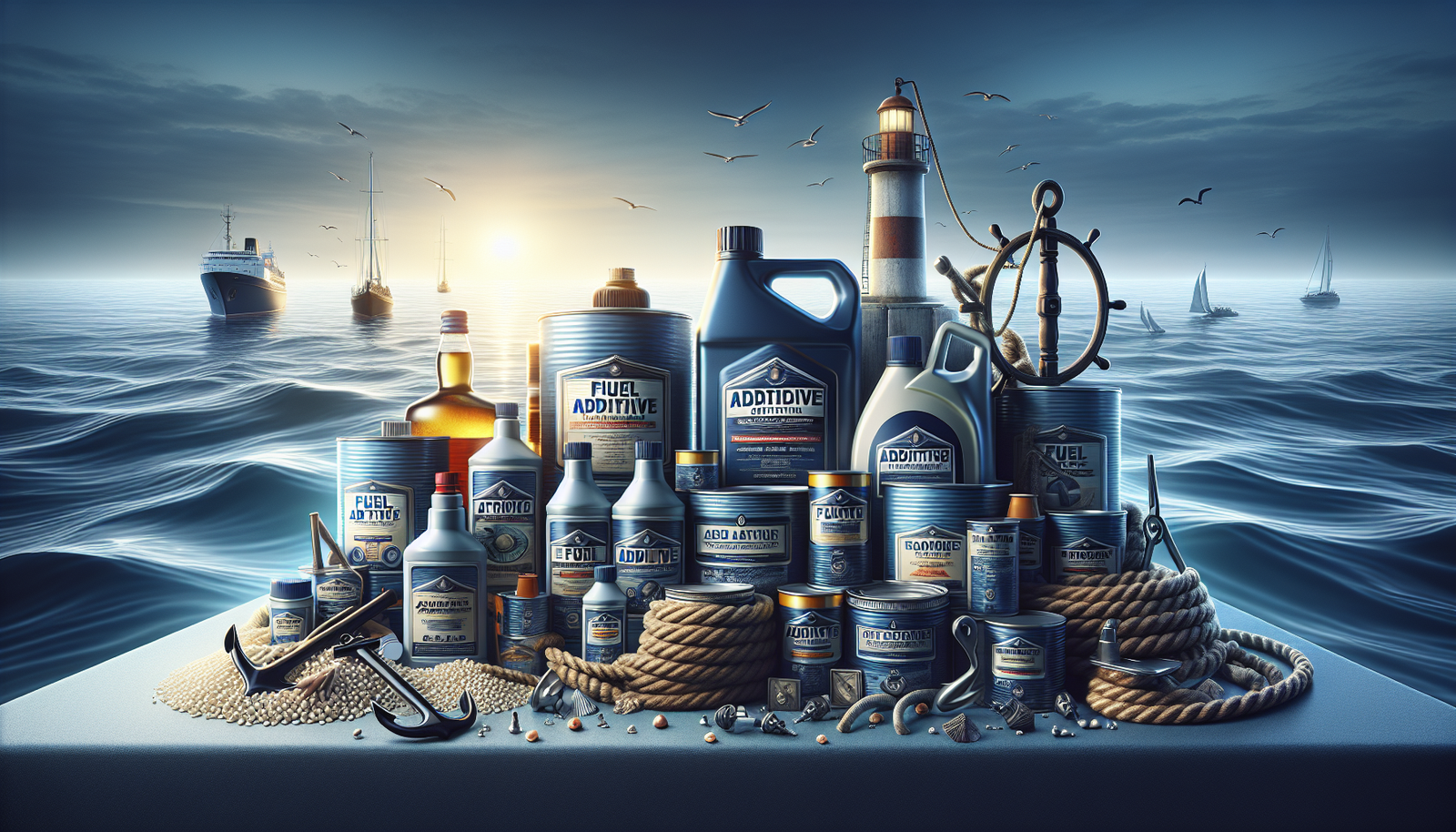Keeping your boat in prime condition means paying attention to every little detail – including the fuel it runs on. Investing in the right fuel additives for your boat engine can significantly improve its performance, longevity, and efficiency, saving you both time and money in the long run. In this article, you’ll find an in-depth analysis of the best fuel additives for boat engines available right now. The meticulously compiled guide delivers an objective understanding of how these additives work and how they can help enhance the performance of your beloved vessel. So, sit back and relax as you set on a journey to give your boat the care it truly deserves.
Understanding Fuel Additives
Fuel additives might seem like a complex topic, but don’t worry—you’ll get a hold of it by the end of this piece. Essentially, a fuel additive is a compound that you add to fuel, enhancing its quality, efficiency, or longevity. They’re like vitamins for your boat’s engine—enhancing its performance and staving off problems.
Definition of Fuel Additives
To define it in the simplest terms, fuel additives are chemical compounds formulated to improve the efficiency and performance of fuel. They’re a bit like supplements for your fuel—they don’t replace the fuel but enhance its performance.
Role and Importance of Fuel Additives in Boat Engines
Fuel additives play a pivotal role in maintaining the health of your boat’s engine. They help keep your engine running smoothly, ensure fuel burns more efficiently, and prevent damaging build-ups in your engine. They can significantly extend the life of your boat’s engine—making them a smart investment for any boat owner.
Types of Fuel Additives
Understanding the different types of fuel additives can be a bit daunting—but you’ve got this! Here’s what you need to know:
Stabilizers
Stabilizers are a big deal when it comes to fuel additives for boats. Their primary role is to preserve fuel, especially when your boat is idle during off-seasons, preventing it from breaking down and causing nasty build-ups in your engine.
Ethanol Treatments
Ethanol in fuel can cause several issues, like corrosion and engine damage. Ethanol treatments work to counteract these problems by combating the negative impacts of ethanol in fuels.
Fuel System Cleaners
As the name implies, these guys clean up your fuel system. They eliminate damaging deposits from fuel injectors, carburetors, and combustion chambers—keeping everything running smoothly and efficiently.
Octane Boosters
Octane boosters work to increase the octane rating of your fuel—helping prevent pre-ignition, improving combustion, and optimising performance.

Significance of Fuel Additives in Boat Engines
Why should you care about fuel additives as a boat owner? Well, they offer a whole host of benefits for your boat.
Increasing Fuel Efficiency
First off, they can help increase fuel efficiency. Fuel additives work to ensure optimal combustion, which helps your boat use fuel more efficiently.
Reducing Emissions
By enhancing fuel burn and reducing engine deposits, fuel additives can also lower your boat’s emissions—helping to do your bit for the environment.
Improving Engine Performance
Through their various actions, fuel additives can also improve engine performance. They prevent issues like stalling, hesitations, and power loss—providing you a smoother ride.
Preventing Corrosion
Fuel additives can also help prevent corrosion of components in the fuel system and engine, substantially reducing maintenance costs in the long run.
Maintaining Fuel System Cleanliness
One key way that fuel additives help maintain your boat’s engine is by keeping the fuel system clean. They reduce and remove harmful deposits that can hamper engine efficiency.
Top Fuel Additives for Boat Engines
Now that we’ve got the basics down, let’s look at some of the best fuel additives you can get for your boat’s engine.
STA-BIL Marine Ethanol Treatment and Performance Improver
This one’s a winner when it comes to battling the negative effects of ethanol in fuel. It works to prevent corrosion, cleans, and lubricates the fuel system for enhanced performance.
Star Tron Enzyme Fuel Treatment
This additive breaks down excess water and sludge to sub-micron size, allowing it to be safely burned off during regular engine use. It stabilizes fuel, improving its performance.
Chevron Techron Marine Fuel System Treatment
The Techron treatment works brilliantly to clean, restore, and protect the entire fuel system. It’s perfect for two-stroke, four-stroke and hybrid engines.
Lucas Oil Safeguard Ethanol Fuel Conditioner with Stabilizers
This additive by Lucas Oil not only counters the damaging effects of ethanol but also stabilizes fuel. It’s a fantastic option for maintaining your boat’s engine.
Sea Foam Marine and RV Treatment
This is a versatile additive that cleans and lubricates your engine while also stabilizing fuel. It’s perfect for everyday use and engine maintenance.

Detailed Reviews of Recommended Fuel Additives
Knowing what fuel additive to get depends a lot on your specific boat and its engine. While this guide provides an overview of the best options out there, you might want to dig deeper before you decide.
Key Features
Different additives have different functions, so you need to know what you’re looking for. Some might excel at cleaning, others might boost performance, or stabilize fuel.
Advantages and Disadvantages
Consider the pros and cons of each additive—nothing’s perfect, so weigh up the options. Make sure you consider the style of your engine and your boating habits when making a choice.
Suitability and Compatibility with Different Boat Engines
Different boat engines might need different additives. For instance, a boat with an older engine might need a different additive than one with a brand-new engine.
Factors to Consider When Choosing Fuel Additives
Choosing a fuel additive for your boat isn’t a decision you should make lightly. It’s crucial you consider these factors:
Type of Boat Engine
The type of engine your boat has could heavily influence which fuel additive is best for you. For example, a two-stroke motor uses a different fuel mixture to a four-stroke, which could influence which additives would be best.
Fuel Used
The fuel type you use in your boat will also affect which additive is right for you. If your fuel contains ethanol, for instance, you may want to look at additives that counteract the negative impacts of ethanol.
Boat Usage
How you use your boat can also have an impact. If your boat is usually idle during off-seasons, you might want to consider stabilizers to prevent fuel from breaking down.
Environmental Compatibility
Before choosing an additive, check how eco-friendly it is. While most additives can reduce emissions, be sure to choose one that does this while causing minimal environmental harm.
Quality of the Product
The quality of the fuel additive is also significant. Ensure that you buy from reputable suppliers and check reviews to see whether the additive lives up to its claims.
Cost
Lastly, consider the cost. Remember, while you might be tempted to save money upfront, a decent fuel additive could save you a lot in maintenance costs down the line.

How to Use Fuel Additives in Boat Engines
Using fuel additives is not complicated, but you should make sure you’re doing it correctly to get the most out of them.
Recommended Dosage
Be sure to use the correct dose. Too little might not give you the elements you need, and too much could cause other issues or simply waste your money.
Safety Precautions
Always follow safety guidelines when handling fuel additives. Most are flammable and can be harmful if swallowed so be sure to keep them out of the reach of children.
Frequency of Use
Check how often you should use the additive. Some might be for each refill, others might be less frequent.
Maintenance
Just because you’re using an additive doesn’t mean you can skip regular maintenance. Regular check-ups are still crucial to the health of your boat’s engine.
The Impact of Fuel Additives on Boat Performance
So, what kind of results can you actually expect from using fuel additives?
Fuel Efficiency
Firstly, you should notice an improvement in fuel efficiency. Your fuel should last longer, saving you money and making your boating trips more cost-efficient.
Power and Speed Increase
By cleaning your engine and improving combustion, additives can also provide a noticeable boost in power and speed.
Reduction in Engine Issues
With regular use of the right fuel additive, you can expect fewer engine issues. The additive will keep your engine cleaner and running smoothly.
Long-term Impact on Engine Lifespan
In the long run, using fuel additives can extend the lifespan of your engine. By preventing corrosion and wear, they help ensure that your engine lasts as long as it should.

Misconceptions and Myths About Fuel Additives
There’s plenty of information out there on fuel additives—but not all of it is accurate.
Clearing Common Misconceptions
Many believe that additives would replace regular maintenance, but this isn’t the case. They’re a supplement to regular maintenance, not a replacement.
Unpacking Prevailing Myths
Some might think fuel additives can fix existing engine problems. However, fuel additives are preventative, not a cure for serious engine problems.
Fact-checking Misleading Claims
Claims like ‘fuel additives can double your fuel efficiency’ should be taken with a grain of salt. While they can help improve efficiency, the impact may not always be this dramatic.
Expert Opinion and Recommendations on Boat Engine Fuel Additives
It’s always a good idea to consult with an expert or do some thorough research before making a choice.
Reviewing Expert Opinions
There are many experts in the field who write or talk about different fuel additives. Be sure to take their opinions into account, but remember that each boat’s needs can be unique.
Understanding Industry Standards
Look to industry standards for guidance. What are the most respected brands in the boat industry recommending?
Adopting Best Practices for Fuel Additive Use
Last, but not least, adopt best practices for fuel additive use. As mentioned earlier, this includes proper dosing, frequency of use, and continued regular maintenance.
That’s a lot of information to digest, but don’t worry—you’re now better prepared to make the right choice of fuel additive for your boat. Remember, the health of your boat’s engine is in your hands, and the right fuel additive could make a world of difference. Happy boating!

